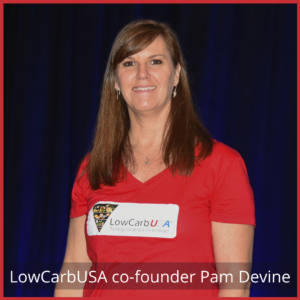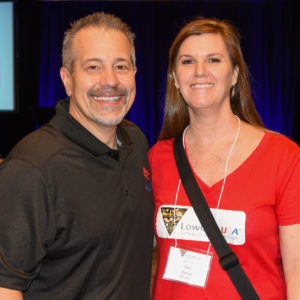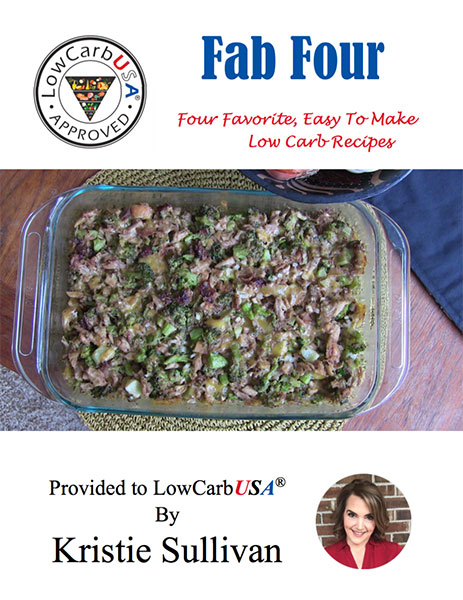LowCarbUSA® co-founder Pam Devine talks about spreading awareness of therapeutic carbohydrate reduction through education, and the opportunities available through certification training for those who want to learn more to help others
 Just a little more than a year ago, most of us were bracing ourselves for the effects of COVID-19. Like most things in life, there were some aspects that were within our control, and many that were not.
Just a little more than a year ago, most of us were bracing ourselves for the effects of COVID-19. Like most things in life, there were some aspects that were within our control, and many that were not.
Pam Devine had just returned from attending the Low Carb Denver Conference (organized by Jeffry Gerber, MD and Rod Tayler, MD) with her partner and LowCarbUSA co-founder Doug Reynolds, and they were both extremely concerned about how the pandemic would affect their organization’s conference scheduled to be held in San Diego in August 2020.
It soon became apparent their fears were justified—social distancing requirements would prevent LowCarbUSA®’s flagship event from being held—and Doug and Pam had to scramble to save their organization from what appeared to be an existential threat.
“Those were some very stressful times for us,” Pam recalled. “When all of a sudden an organization like ours that puts together events could no longer have people come together, we were petrified.”
As it turned out, Doug and Pam found a way to adjust to the adverse conditions, and they pulled together the very successful 2020 Virtual San Diego Conference, their first online metabolic health conference.
“We’ve been very fortunate to have been able to develop these online capabilities, said Pam, who serves as operations manager for LowCarbUSA®. “People would love to be able to travel and get together, but we made adjustments and found a way to actually reach more people in an online virtual summit, including many who never would have been able to get to one of our live events.”
LowCarbUSA’s January 2021 event, which had been scheduled to take place in Boca Raton, Florida, was also converted to a very successful online event, and the future of LowCarbUSA® is bright, although it’s still unclear as to when in-person events will be able to resume. This summer’s event is being planned as a virtual event, with the possibility of pivoting and adding an upgraded registration option if a live event becomes possible.
Taking Advantage of Online Learning and Certification Opportunities
 The lockdown has had devastating effects on a vast number of individuals and organizations across the globe, but one thing has become clear—there are opportunities for those who look for them.
The lockdown has had devastating effects on a vast number of individuals and organizations across the globe, but one thing has become clear—there are opportunities for those who look for them.
After witnessing firsthand the power of the internet to bring people and ideas together in a learning environment, Pam decided to take advantage of her time in lockdown to do something she’d been meaning to do for a while. She went through the extensive Nutrition Network Advisor Training Course through their global training and certification partners, with the hope of using what she learned to reach and guide even more people in need of education, support and hope in areas related to metabolic health, nutrition and fitness.
“The Advisor Training course is an online course that is perfect for anyone who wants to help others with one or more aspects of their lives,” she said. “This would be a great foundation with which to start a coaching program, but it also provides valuable information and tools that will help with your own goal setting and personal development.”
This training has been developed to provide the latest evidence-based science and research in therapeutic nutrition strategies, as well as important coaching and motivation-driving skills designed to provide students with the ability to help others achieve the health and fitness goals they’ve dreamed of.
Training in therapeutic carbohydrate reduction can be particular useful as a tool at a time when obesity and metabolic disease have reached epidemic levels. Nearly half a billion people are living with Type 2 diabetes worldwide and the number is projected to increase by 25% in 2030 and 51% in 2045, according to the International Diabetes Federation Diabetes Atlas.
While the Advisor Training is geared for non-clinicians, many healthcare practitioners have provided feedback that the behavioral support and motivation techniques taught in this course help medical professionals instill positive change. These techniques aren’t something they had previous training in during medical school, and are helping them to support their patients in a more effective manner. In global partnership with the Nutrition Network, LowCarbUSA® offers certification training for doctors, nurses, and all allied healthcare professionals, with special programs designed for nutritionists and dietitians, fitness and exercise specialists, and addiction recovery specialists.
“One of the most valuable aspects of this training is how it prepares you to address the client or patient’s needs,” said Pam. “This is important, even for the established healthcare professional because, unfortunately they don’t often learn behavioral support in their medical training,”
Once a LowCarbUSA Premium Member successfully completes one of these CME-approved courses, they become eligible to display the ‘LowCarbUSA® Certified’ badge on their membership profile, as well as on their own website and elsewhere. This training can also be applied to the accreditation process with the new nonprofit, the Society of Metabolic Health Practitioners (SMHP), which culminates with a prestigious Metabolic Health Practitioner (MHP) designation. The SMHP was founded by Doug in December of 2020.
“This is a great starting point on the path to accreditation at the SMHP,” said Pam. “That would be the logical first step, and then the different paths to accreditation are laid out on the SMHP website.”
Pam intends to continue her training, following the Nutrition Network accreditation pathway. She recently started the second course—Professional Training in LCHF/ Ketogenic Nutrition and Treatment—which when completed, will leave her with two more courses before she can attain her MHP accreditation. The other two courses remaining are LCHF in Clinical Practice and Ethics. Those applying for accreditation must also earn Continuing Metabolic Health Education (CMHE) credits from an approved provider.
Raising awareness about therapeutic carbohydrate reduction
Pam says her motivation to pursue the accreditation process stems from a desire to learn how to reach more people with education that can help to make a difference in the lives of people struggling to overcome metabolic disease.
“We know that therapeutic carbohydrate reduction is making an important difference in so many people’s lives,” said Pam, “and more needs to be done to raise awareness that many chronic illnesses, especially type 2 diabetes, does not have to be chronic and progressive. We have seen that cutting carbohydrates is sustainable, and can be a viable lifestyle that can help restore health and reduce future complications tremendously.”
“One of the things that inspires us the most is providing hope for people who previously had none,” said Pam. “I think little by little we’re seeing that our focus on metabolic health is giving people hope that they can get their health back. Often they then want to pay it forward.”
Unfortunately, there is widespread misinformation and confusion about low-carb approaches, as well as resistance from various competing interests.
“I know there’s a lot of misinformation out there, and there’s conflicting information in the media, including those who refer to low carb as a fad diet like, but I believe we’re making progress.”
She points to the growing number of high profile low-carb success stories as a positive sign, including physicians like Dr. Tro Kalayjian, who used the low-carb lifestyle to lose more than 150 pounds and regain control of his health.
“Dr. Tro is a perfect example of what has to change within the medical system,” she said. “Doctors should be getting information about metabolic health and carbohydrate reduction in medical school. They shouldn’t have to figure it out on their own after becoming overweight and getting sick how to not only help themselves to better health but their patients as well. Dr Tro knew his advice wasn’t working for himself, and was confused about how to support his patients who were often in similar situations. He didn’t want to continue to give the advice that wasn’t effective, so he has never stopped continually learning, and implementing different new approaches with his patients safely and effectively“
Pam looks forward to the day where therapeutic carbohydrate reduction is accepted as a legitimate and safe approach by practitioners, and not undermined by governmental agencies, the Dietary Guidelines, insurance companies and other special interests.
“You shouldn’t have to find this valuable health information in some corner of the internet. You shouldn’t have to find it on YouTube. Options like this should be presented to you by your medical professional.”
It is also her hope that this education and awareness process will begin reaching more people before it’s too late. “We want to reach people before they get sick, before they lose all hope. We want people to be able to take control of their health before they suffer serious health consequences including the many healthcare professionals who find them in the same boat as many in our community.”
How Pam and Doug got started with the low-carb lifestyle
As Pam explained her motivation for spreading awareness and education about the low carb lifestyle, she recalled how she and Doug first became acquainted with carbohydrate reduction back in the summer of 2015..
“Doug and I were both working in a very stressful startup company, on the executive team. We were working out quite a bit, doing martial arts three days a week, and we were running at least two or three days a week, but sitting at very stressful desk jobs, we noticed we were both putting on weight.”
They were both consuming a lot of carb-based products, still believing in carb loading to fuel their running and other physical activities. They were consuming carb-based drinks, not realizing that they were likely becoming insulin resistant.
“We didn’t even know about the term insulin resistance. We just knew that we were putting on weight. One day, Doug received an email from someone talking about the ketogenic diet, and he began delving deeply into it, reading books and articles, before stumbling upon the film Cereal Killers, which really got our attention.”
Shortly thereafter, they began their low-carb journey, “Doug said, ‘We’re going shopping, and I have a list.’ I said, ‘Wait a second, you’re going to the grocery store with me and you have a list?’. My initial reaction was if we’re going to be cutting out all the grain based products, where am I going to get all my vital nutrients?”
For years, they had both been sticking to low fat recommendations and adding whole grains and fruits and vegetables to their diet, as well as switching to things like whole wheat pasta while trying to stay away from white starchy foods, “trying to go along with the advice I’d always heard was recommended for a healthy diet. I even remember trying to get raw sugar because I’d heard that was healthier. I also believed at the time that watermelon was a low-carb fruit.”
The low-carb way of eating turned out to be both effective and sustainable for both Doug and Pam, with both seeing improvement in their health and weight.
The Tim Noakes Connection
“Not long after switching over to a low carb lifestyle, Doug was talking about the diet with his mom, who told him it sounded like the ‘Tim Noakes Diet’. Doug was stunned, because as an accomplished ultramarathoner, he viewed Tim as a hero and running mentor.”
Noakes authored the hugely successful The Lore of Running, a nearly 1000-page book known by many as the distance runners bible. When he wrote the book in 1986 he was still recommending carbohydrate loading as a strategy for workouts and races.
“Doug was shocked to see Tim talking about tearing out pages of his book, talking about carb loading, and saying, ‘I’m sorry, I was wrong.’ Tim acknowledged excessive carbohydrate consumption could lead many down the road to type 2 diabetes.”
“It wasn’t long after we had heard about Professor Noakes’ changed view on carbohydrates,” said Pam, “And we saw that he and many others had put together some conferences. That got us interested in the idea of putting together conferences of our own.
Near the end of the movie Cereal Killers, Pam recalled Noakes saying “We’re changing the world one meal at a time,” and I just got chills and was inspired. I said out loud, ‘How can we help? How can we be a part of this?”
Pam and Doug decided they wanted to find a way to help people and get the information about nutrition, and the harm in overdoing carbohydrates, out to the people who needed it most.
“As we talked, we thought, well, we have some previous conference experience, and we could invite people to come speak and give them a platform to share their research and their clinical experiences and their scientific data with others.”
Pam and Doug went on to build a great relationship with The Noakes Foundation, and have had their presence at every one of our San Diego conferences.
“We are proud of our partnership with the foundation and the spin-off the Nutrition Network as our global training, certification and accreditation partners,” said Pam. “We even had the incredible opportunity to meet Professor Noakes at his office in the Sports Science Institute of South Africa in Cape Town in 2017.”
Initially, Pam and Doug started out wanting to teach anybody who had some interest and curiosity in their own health, but they quickly came to realize there were healthcare professionals who could really make more of a difference once they learned about carbohydrate reduction as a therapy, and its many applications.
The creation of LowCarbUSA®
LowCarbUSA® was founded in the beginning of 2016 with the intention of providing an annual conference for internationally renowned scientists and medical practitioners to present the ever-increasing body of evidence that overconsumption of carbohydrates was leading many down the path of ill health, metabolic dysfunction, and insulin resistance. The intent was to show practitioners that reducing carbohydrates in the diet has been shown to be extremely beneficial in supporting metabolic health, and the many function of the human body and mind.
The first conference was held in San Diego later in 2016, and its success has led to a long string of successful conferences across the world. The 2021 San Diego Conference will be the organization’s 15th conference.

Dr. Brian Lenzkes and Pam Devine at the LowCarbUSA Boca Conference in January 2020.
The LowCarbUSA® mission quickly evolved when they realized how important this was to the medical professional community. Valuable tools are needed, not only to provide hope to their patients to reverse and prevent disease, but to restore hope to the practitioners.
The tools and resources LowCarbUSA® has been providing, includes not only the live and virtual conferences, but also a growing library of educational videos, a database of practitioners, nutritionists and sports trainers who are open to learning more about carbohydrate reduction and implementation, and a searchable database for papers and articles covering the research into the evidence supporting this lifestyle.
LowCarbUSA® has also established a panel of advisors to oversee the creation and maintenance of a set of ‘Clinical Guidelines for Therapeutic Carbohydrate Restriction‘ which was first published in May, 2019 and has now been translated into seven languages, with more in the works.
“Because we care so deeply about reaching as many people as we can, we work at this constantly,” said Pam. “Doug Reynolds is the hardest working person I know. We’re both so inspired daily, as we continue to see what one person can do when they learn how to use these tools. They can change the quality of their own lives, and then go on to reach and change others. And it can be exponential. Teaching one person can lead to hundreds and thousands of changed lives.”
“We want to be highlighting the positive changes that can occur for people and be a platform for good information that counters the misinformation that’s out there,” said Pam. “When people that say it can’t be done, that it’s not sustainable, we want to make sure that we are part of the solution and provide the education they need to make a difference. People can do it. We see thousands of people doing this every day. What we need to do is bring positive information to more people that says this can be done, this is attainable. We need to continue to provide tools and resources, and most importantly, hope.”
Pam says while there is still a great deal of work to do, she is optimistic is about the future.
“I can’t tell you how many times we’ve heard both health care practitioners and individuals suffering from the effects of metabolic disease and obesity say that they had lost all hope. We’ve seen health care practitioners with so much despair about not being able to help their patients in this growing atmosphere of chronic illness, and metabolic dysfunction, that they were actually looking to get out of medicine and find a different career. Finding something that works and is sustainable, can restore that hope and help them regain their passion for life.”

